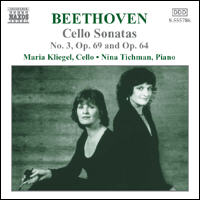The Sonata in A major, Opus 69, was written in 1808 and dedicated to Beethoven’s intimate friend Baron Ignaz von Gleichenstein, an amateur cellist, who helped the composer in business matters, arranging his pension from a group of rich patrons in 1809 and joining with him in the courtship of the sisters Anna and Therese Malfatti, the first of whom married Gleichenstein in 1811, bringing his close friendship with Beethoven to an end. On the autograph of the sonata Beethoven wrote the words Inter lacrymas et luctus (Amid tears and sorrows), but there is little sign of this in the music. The cello opens the first movement, in its lower register, sustaining the dominant of the key to anchor the piano’s response. Rôles are reversed, before the introduction of a second subject, shared by the two instruments. This material is developed in a central section, before the return of the first theme in recapitulation, played by the cello, with a running triplet piano accompaniment. The second movement is in the form of an A minor Scherzo, repeated to frame an A major Trio, with its opening cello double-stopping and lower register piano accompanying figuration. As in some of the piano sonatas, there is no full slow movement, but a brief E major Adagio, which leads directly to a final Allegro vivace, dominated by the first subject announced by the cello, which later introduces a contrasting second subject. It is the first that forms the substance of the central development and the closing section of the sonata
for Cello and Piano Vol.2
